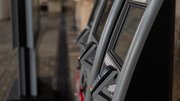Article
Health care Kiosks 101
From anxiety over test results to anxiousness while sitting in a hospital bed, patients need every tool possible to help relieve stress. One of these tools that can make the process of hospital visits easier are health care kiosks.

April 17, 2015 by Bradley Cooper — Editor, ATM Marketplace & Food Truck Operator
When someone visits a hospital, he or she can encounter many potential stressors. From anxiety over test results to anxiousness while sitting in a hospital bed, patients need every tool possible to help relieve stress. One of these tools that can make the process of hospital visits easier are health care kiosks. KioskMarketplace talked to key health care kiosk manufacturers to discover the best practices to improve overall customer satisfaction and experience.
Kiosk manufacturer RedyRef Kiosk Solutions develops touchscreen kiosks for hospitals to aid patients with directions and provide directories.
"Our kiosks provide up to date information in multiple languages, along with directions around the facility," RedyRefSenior Business Development Manager Chris Mitcham said. "They can list events, classes and other services. Each kiosk can provide health care information, link to the hospital website and post announcements for visitors and staff."
The RedyRef kiosks are designed to reduce stress for new visitors to hospitals and save time for employees. "We include concise maps tied to lists of physicians by name and department as well as direct people to meeting and/or class rooms," Mitcham said. "Hospital directions can be printed or downloaded into visitor smart phones, reducing visitor stress and repeated need to get directions."
"Our editors allow for last minute changes to scheduled times and locations. Each kiosk is Americans with Disabilities Act compliant and operational 24 hours a day, seven days a week," Mitcham said. The main goal of these features is to create an environment where a patient does not feel lost and confused as soon as they enter the hospital.
"They permit staff to handle more personal requests and reduce confusion for visitors in locating departments and building amenities."
Kiosk manufacturers and software developers Phoenix Kiosks also provide key services to patients and hospitals with their kiosks. "We have a kiosk solution that we developed for the American Heart Association that instructs users how to perform CPR," Phoenix Kiosks President Jody Chaffin said. "The first unit is located in the Dallas airport and travelers can learn CPR while waiting on their flight."
One potential stressor for patients is concerns over the privacy of their personal healthcare information. "We are always looking to improve the ease with which visitors interact with the kiosk and providing as much information as needed, and still preserve patient privacy," Chaffin said.
Chaffin provided some basic guidelines that all healthcare kiosks should follow. "Medical kiosks must be ADA compliant to ensure everyone has access to them. The software has to be developed to provide an intuitive, user-friendly interface that makes it easy for users to understand what they need to provide and to be able to understand the information they receive."
Phoenix is also working on kiosk solutions to patient privacy concerns. "Those kiosks will be built to provide privacy (visual and audible)," Chaffin said. "In addition, the software applications, will be developed so the software follows the standards such as requiring unique user authentication, encrypting stored or transmitted data, providing an audit mechanism to ensure there has been no unauthorized access or modifications, and providing the ability to remotely wipe all data."
Another key stressor for patients is the doctor consultation itself. Kiosk manufacturer HealthSpot is attempting to address this issue with its HealthSpot Station.
"To improve utilization of the kiosks, HealthSpot combines the convenience of telemedicine with the confidence of a face-to-face exam, increasing access to care and making it easy to use," HealthSpot CEO Steve Cashman said.
"With integrated digital medical devices, high-definition videoconferencing, secure patient health records and an in-person medical attendant always on hand to help use devices or answer questions as needed, the HealthSpot platform has been recognized by medical boards and health systems as being truly equivalent to an in-person visit for similar services."
The HealthSpot Station also provides a variety of medical instruments such as a stethoscope, pulse oximeter or otoscope. The doctor will instruct the patient on how to use these devices. From there, the doctor can make diagnoses and recommendations for the patient.
"The HealthSpot station gives patients a convenient location to get a last-minute visit with a high-quality provider so they can get in, get out and get better, without disrupting their daily lives," Cashman said.
Although eliminating stress completely at hospitals is likely impossible; kiosks can provide patients with helpful self-service tools that create a less painful experience.
(Picture by DarkoStojanovic via Pixabay)
 ChatGPT
ChatGPT Grok
Grok Perplexity
Perplexity Claude
Claude









